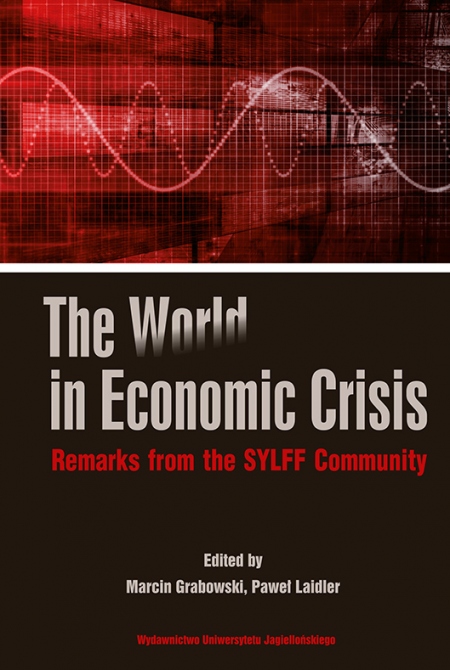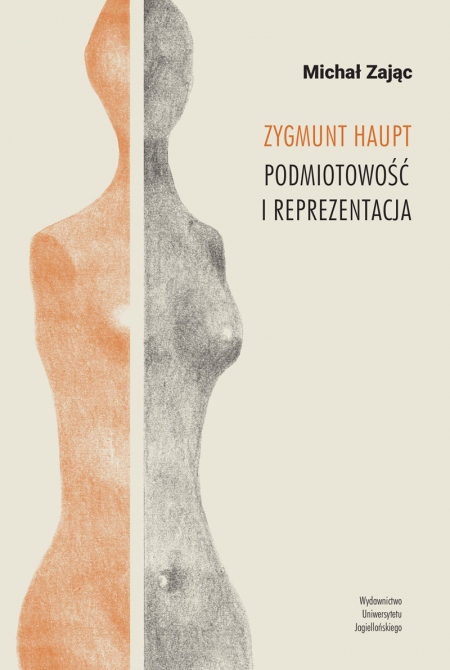The World in Economic Crisis
Remarks from the SYLFF Community
Redakcja: Paweł Laidler, Marcin Grabowski
Liczba stron: 142
Format: B5
Rok wydania: 2012
Data premiery: 01.09.2012
Opis książki
The economic crisis initiated by the collapse of Lehman Brothers turned out stronger and broader than anyone expected. From banking and financial sectors in the U.S. it spread especially to Europe, and, to lesser extent, to Asia. Having in mind the meaning of the problem, Jagiellonian University SYLFF Fellows Association (JUSFA) decided to invite representatives of its counterparts from all around the world to a scientific conference Europe and the World in Crisis: Challenges and Opportunities. The conference became the main part of the 20lh anniversary of the SYLFF program at the Jagiellonian University. The celebrations took place in the Main Hall of Collegium Maius on September 7th, 2012. The main organizers of the event were the Nippon Foundation, the Tokyo Foundation, the Jagiellonian University SYLFF Steering Committee, and the Jagiellonian University SYLFF Fellows Association. Among honorable guests of the event were the representatives of the Tokyo Foundation and the Nippon Foundation with its President, Mr. Yohei Sasakawa, the son of Mr. Ryoichi Sasakawa, the principal funder of SYLFF who signed the documents in 1992 thus initiating a very successful scholarship program for M.A. and PhD. students. Other guests included the authorities of the University, with Rector Wojciech Nowak and Vice-Rector Andrzej Mania the members of JU Steering Committee and SYLFF Fellows from Poland and different countries.
Based on the presentations from the conference and discussions followed, eight SYLFF fellows from five countries (Hungary, Indonesia, Latvia, Portugal, and Poland), decided to prepare set of papers analyzing both national and multilateral dimensions of the economic crisis, including its social, political or cultural ramifications. Peer reviewed papers were published in this monograph, becoming a contribution to future academic discussion of the
Based on the presentations from the conference and discussions followed, eight SYLFF fellows from five countries (Hungary, Indonesia, Latvia, Portugal, and Poland), decided to prepare set of papers analyzing both national and multilateral dimensions of the economic crisis, including its social, political or cultural ramifications. Peer reviewed papers were published in this monograph, becoming a contribution to future academic discussion of the
Marcin Grabowski, Pawel Laidler
Język publikacji
angielski
Redakcja
Paweł Laidler
, Marcin Grabowski
ISBN: 978-83-233-3554-2
e-ISBN (pdf): 978-83-233-8882-1
Kraj pochodzenia producenta: Polska
POLECANE KSIĄŻKI
65,00
zł
52,00
zł
NOWOŚCI

The World in Economic Crisis
Remarks from the SYLFF Community
SPIS TREŚCI
TABLE OF CONTENTS
Ilona Baumane-Vitolina
Ilona Baumane-Vitolina
Change Management Experience in the Baltic States 9João António Furtado Brito
Introduction 9
Theoretical background of the research 10
Research methodology 13
Main findings 15
Baltic managers from a Western perspective 18
Conclusion and implementation for managers 23
References 24
The Challenges of Economic Crisis in Portugal 25Reny Fitriana Kaban
Introduction 25
Economic growth, evolution of the Portuguese public accounts and outlook 26
Memorandum of Understanding – the economic adjustment programme 36
1. Fiscal sector 37
2. Financial sector 38
3. Labor market sector 38
4. Competition and business environment sector 39
Implementation of the economic adjustment programme 40
Conclusion 41
References 41
The World in Economic Crisis: What Are the Causes and the Impact on Asia, Particularly Indonesia 43Marcin Grabowski
Introduction 43
The causes of economic crisis 44
1. The global financial crisis in 2008 44
2. The sovereign debt crisis of the euro area 45
Causes of European Union debt crisis 47
The European debt crisis: implications for Asia 48
Impact of the crisis 49
Public debt financing in Asia less at risk 49
Systemic implications for macroeconomic coordination in Asia and the Pacific 52
The Euro crisis and its impact on Indonesia’s economy 54
Conclusion 55
References 56
Monetary Integration in Europe and Asia and Economic Crises 57Loretta Huszák
Optimum currency area 58
European monetary union and convergence criteria 60
Asian monetary integration 67
Conclusion 70
References 72
Holistic Approach and Intellectual Property 75Sarojini Imran
1. Economic crises and intellectual property 75
2. IP and economic growth 76
3. How are IPRs structured 79
4. NIPOs adapting to changing realities: the holistic approach 84
5. Copyright issues in the portfolio of national IP offices 85
6. Increased attention to enforcement issues among the NIPOs 87
7. Innovation support and NIPOs 90
8. Conclusion: a holistic approach in the administration of IPRs 91
References 92
Opportunities and Challenges for Tourism between European and Southeast Asian Countries 95Paweł Laidler
Introduction 95
Tourism in Europe 97
Economics in Southeast Countries 99
Top Ten Country/Regional Sources of Visitors to ASEAN as of 30 June 2012 101
ASEAN Tourism Strategic Plan 2011–2015 104
Analysis 104
Conclusion 105
References 106
The Economic Crisis in the 2012 U.S. Presidential Elections: Challenges and Expectations 107Csaba Mate Sarnyai, Tibor Pap
References 123
The Role of Dynamic Democracy in the Formation of Europe-level Solidarity and Identity 127
1. Introduction 127
1.1. Preliminary comments on the context 127
1.2. A theoretically-minded lead-in 128
1.3. The role of subsystem structures in the social inclusion of economy 130
1.4. The possible roles of ‘state’ and politics in the proces of Europeanization 131
2. Models of interpretation 133
2.1. The social-theoretical basis of the policies aiming at mitigating Inequities 133
2.2. Interactions between subsystems of socjety 134
3. Dynamic democracy 135
3.1. Ideal types of representational politics in the 19th and 20th centuries 135
3.2. Changing trends in political representation at the turn of the millennium 135
3.3. The inactivity of the EU and representation 136
3.4. How is efficient EU-representation possible in popular democracies? 137
4. The mutual irritations of subsystems: interpenetration of specific policies 138
5. Summary 139
References 140
SPIS TREŚCI
TABLE OF CONTENTS
Ilona Baumane-Vitolina
Ilona Baumane-Vitolina
Change Management Experience in the Baltic States 9João António Furtado Brito
Introduction 9
Theoretical background of the research 10
Research methodology 13
Main findings 15
Baltic managers from a Western perspective 18
Conclusion and implementation for managers 23
References 24
The Challenges of Economic Crisis in Portugal 25Reny Fitriana Kaban
Introduction 25
Economic growth, evolution of the Portuguese public accounts and outlook 26
Memorandum of Understanding – the economic adjustment programme 36
1. Fiscal sector 37
2. Financial sector 38
3. Labor market sector 38
4. Competition and business environment sector 39
Implementation of the economic adjustment programme 40
Conclusion 41
References 41
The World in Economic Crisis: What Are the Causes and the Impact on Asia, Particularly Indonesia 43Marcin Grabowski
Introduction 43
The causes of economic crisis 44
1. The global financial crisis in 2008 44
2. The sovereign debt crisis of the euro area 45
Causes of European Union debt crisis 47
The European debt crisis: implications for Asia 48
Impact of the crisis 49
Public debt financing in Asia less at risk 49
Systemic implications for macroeconomic coordination in Asia and the Pacific 52
The Euro crisis and its impact on Indonesia’s economy 54
Conclusion 55
References 56
Monetary Integration in Europe and Asia and Economic Crises 57Loretta Huszák
Optimum currency area 58
European monetary union and convergence criteria 60
Asian monetary integration 67
Conclusion 70
References 72
Holistic Approach and Intellectual Property 75Sarojini Imran
1. Economic crises and intellectual property 75
2. IP and economic growth 76
3. How are IPRs structured 79
4. NIPOs adapting to changing realities: the holistic approach 84
5. Copyright issues in the portfolio of national IP offices 85
6. Increased attention to enforcement issues among the NIPOs 87
7. Innovation support and NIPOs 90
8. Conclusion: a holistic approach in the administration of IPRs 91
References 92
Opportunities and Challenges for Tourism between European and Southeast Asian Countries 95Paweł Laidler
Introduction 95
Tourism in Europe 97
Economics in Southeast Countries 99
Top Ten Country/Regional Sources of Visitors to ASEAN as of 30 June 2012 101
ASEAN Tourism Strategic Plan 2011–2015 104
Analysis 104
Conclusion 105
References 106
The Economic Crisis in the 2012 U.S. Presidential Elections: Challenges and Expectations 107Csaba Mate Sarnyai, Tibor Pap
References 123
The Role of Dynamic Democracy in the Formation of Europe-level Solidarity and Identity 127
1. Introduction 127
1.1. Preliminary comments on the context 127
1.2. A theoretically-minded lead-in 128
1.3. The role of subsystem structures in the social inclusion of economy 130
1.4. The possible roles of ‘state’ and politics in the proces of Europeanization 131
2. Models of interpretation 133
2.1. The social-theoretical basis of the policies aiming at mitigating Inequities 133
2.2. Interactions between subsystems of socjety 134
3. Dynamic democracy 135
3.1. Ideal types of representational politics in the 19th and 20th centuries 135
3.2. Changing trends in political representation at the turn of the millennium 135
3.3. The inactivity of the EU and representation 136
3.4. How is efficient EU-representation possible in popular democracies? 137
4. The mutual irritations of subsystems: interpenetration of specific policies 138
5. Summary 139
References 140
Wybierz rozdziały:
Wartość zamówienia:
0.00 zł























